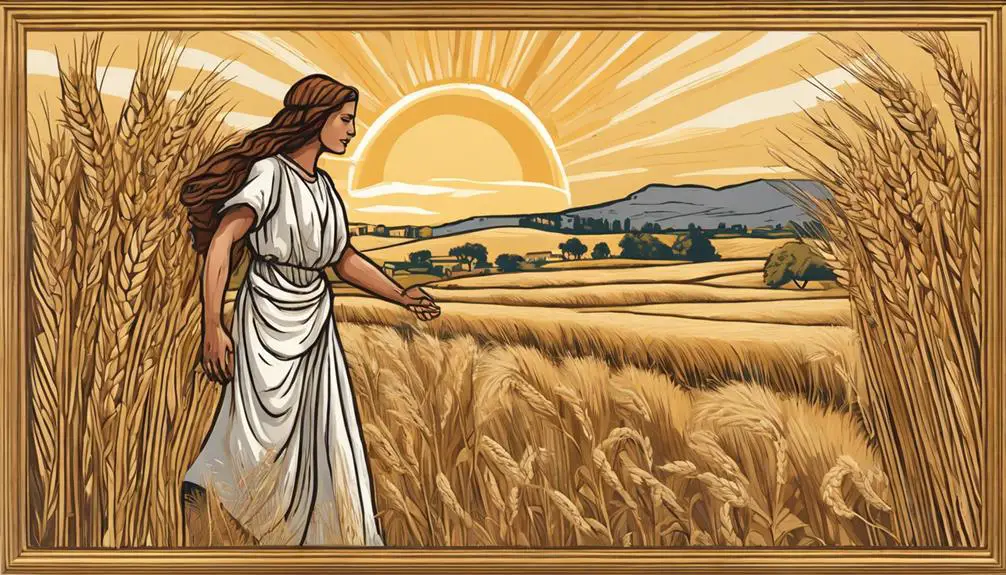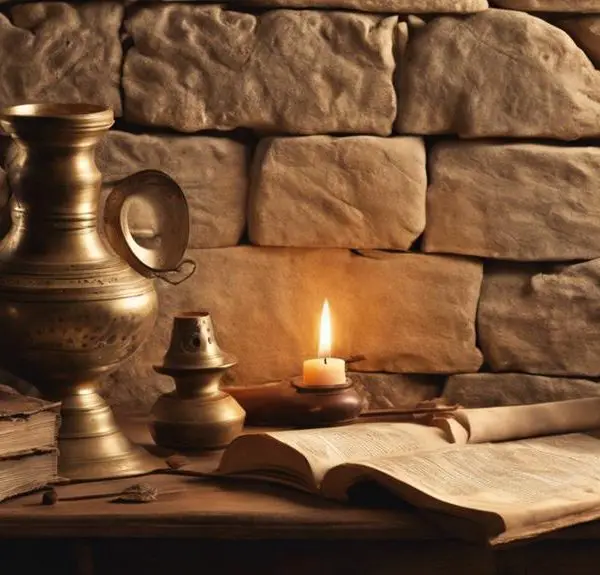Explore how biblical divas challenge norms and inspire with their tales of strength, rebellion, and leadership, reshaping perceptions of faith and femininity.

Divas in the Bible
Have you ever wondered if the Bible, often perceived as a patriarchal text, actually celebrates female strength and independence?
The tales of Deborah, Esther, Ruth, Mary Magdalene, and Jael aren't just footnotes; they're powerful narratives of divas in their own right, challenging norms and shaping destinies.
These women's stories offer a unique lens through which to view spiritual and societal roles, defying traditional expectations with grace and audacity.
Let's explore how their legacies continue to inspire and provoke thought in modern discussions about faith, feminism, and leadership. What secrets and lessons do their lives hold for us today?
Key Takeaways
- Biblical divas showcased remarkable leadership, from Deborah's victory in battle to Esther's royal negotiations to save her people.
- Acts of love and loyalty are central, exemplified by Ruth's unwavering commitment to Naomi and integration into a new community.
- Transformation and redemption are powerful themes, as seen in Mary Magdalene's journey from sin to sainthood and pivotal role in early Christianity.
- Defiance against societal norms and empowerment of women are highlighted through Jael's heroic act, challenging gender expectations in a patriarchal context.
Deborah: Prophetess and Warrior

Among the formidable figures in the Hebrew Bible, Deborah stands out as both a prophetess and a warrior, embodying a unique blend of spiritual insight and military prowess. Her story, primarily recounted in the Book of Judges, chapters 4 and 5, highlights her exceptional judicial leadership and her role in leading Israel to victory against the Canaanite forces led by Sisera. Deborah's leadership is multifaceted: she serves not only as a judge, resolving disputes and guiding the Israelites with wisdom, but also as a military leader, a role rare for women in the biblical narratives.
Her judicial leadership is marked by her ability to command respect and obedience from the Israelite tribes, an indication of her profound influence and authority. Moreover, Deborah's song of victory, often referred to as the 'Song of Deborah,' stands as one of the oldest and most significant pieces of poetry in the Hebrew Bible. This song not only celebrates the triumph over the Canaanite forces but also immortalizes Deborah's legacy as a leader who skillfully combined spiritual depth with decisive action. Through this narrative, Deborah's story offers a powerful testament to the complex roles women have played in biblical history.
Esther: Queen of Courage
Shifting our focus to another remarkable woman in the Hebrew Bible, we encounter Esther, a queen whose courage and strategic acumen saved her people from annihilation. Esther's story is a vivid portrayal of royal strategy and cultural defiance, offering a unique lens through which to understand the dynamics of power and identity in ancient times.
Aspect |
Esther's Role |
Impact |
|---|---|---|
Royal Strategy |
Utilized her position |
Prevented genocide |
Cultural Defiance |
Refused assimilation |
Preserved Jewish identity |
Diplomacy |
Negotiated with the king |
Secured her people's safety |
Courage |
Risked her life |
Became a national hero |
Legacy |
Inspired generations |
Embodies bravery and wisdom |
Esther's narrative showcases how she leveraged her royal status to challenge the decrees threatening her people. Her strategic interventions, marked by cultural defiance, underscore the complexities of navigating identity within a dominant culture. Esther's bravery, coupled with her astute understanding of palace intrigue, underscores the pivotal role women have played in shaping history. Her legacy, steeped in courage and wisdom, continues to inspire a scholarly appreciation for the intricate interplay of power, identity, and resistance.
Ruth: Loyal Love Redefined

Turning our attention to Ruth, we observe a profound redefinition of loyal love through her unwavering commitment and actions. Unlike other narratives that may delineate loyalty as a passive trait, Ruth's story is a testament to the active, courageous pursuit of love and security, not just for herself but for her mother-in-law, Naomi.
Analyzing Ruth's migration, a deliberate act following the death of her husband, one can't help but admire her resolve. Opting to leave her homeland, she embodies a loyalty that transcends mere familial obligation, venturing into the unknown with Naomi.
The harvest's significance in Ruth's narrative further deepens our understanding of her loyalty. It's during the harvest that Ruth's dedication materializes into action. By gleaning in the fields to provide for Naomi and herself, she engages in a laborious yet humble act of love. This period not only highlights her resilience but also sets the stage for her eventual integration into a new community and lineage, ultimately shaping the lineage of David and, by extension, the messianic lineage.
Ruth redefines loyal love as an active, selfless pursuit, challenging us to see loyalty not as a mere sentiment but as a powerful force for change and continuity.
Mary Magdalene: From Sinner to Saint
Just as Ruth's story redefined loyal love through action, Mary Magdalene's narrative transforms our understanding of redemption, casting her journey from sinner to saint in a new light. Historical perceptions of Mary Magdalene have fluctuated vastly, often overshadowing her significant role in the early Christian community. Once labeled merely as a repentant prostitute, recent scholarly interpretations and biblical reassessments have sought to correct this misrepresentation, highlighting her as a pivotal figure in the redemption journey of Christian theology.
Analyzing the texts, you'll find that Mary Magdalene's story is one of unwavering faith and transformation. Her presence at crucial moments—witnessing the crucifixion, burial, and being the first to see the resurrected Jesus—underscores her importance. This shift from a sinner to a central spiritual figure illustrates the potential for redemption and transformation within the Christian faith.
Your understanding of her redemption journey challenges you to reconsider the dynamics of forgiveness and spiritual renewal. Mary Magdalene's evolution from a historical perception of sinfulness to a saintly status underscores the transformative power of faith and the inclusive nature of redemption.
Jael: Defying Expectations

In the narrative of Jael, the Bible presents a tale of unexpected heroism and strategic defiance that challenges conventional gender roles of the time. You're drawn into a story where hospitality turned deadly, as Jael, a woman of her time, leverages her domestic space as a battlefield. She extends an offer of refuge to Sisera, a fleeing general, only to turn the tables in a dramatic and fatal twist.
- Hospitality turned deadly: Jael's act of welcoming Sisera into her tent under the guise of safety, only to betray him, flips the script on expected female subservience and hospitality in her culture.
- Tactical tent peg: Utilizing a tool from her domestic environment, Jael employs a tent peg as a weapon, showcasing her resourcefulness and courage. This act not only signifies her physical strength but also her tactical acumen.
- Defying gender norms: Jael's decisive action against Sisera not only contributes to the victory of Israel but also challenges the patriarchal expectations of her society, highlighting her as a figure of empowerment and defiance.
This account underlines the complexity of Jael's character, who embodies both hospitality and ferocity, and whose actions transcend the boundaries imposed by her gender.
Frequently Asked Questions
How Did Cultural and Societal Norms of Their Times Influence the Roles and Perceptions of These Biblical Divas?
You're exploring how cultural norms and societal expectations of their eras shaped the roles and perceptions of influential women. Gender roles, deeply ingrained in these societies, often dictated women's actions and societal standings.
Are There Any Recorded Reactions From Their Contemporaries About Their Actions and if So, What Were They?
You're diving into an ocean of ancient narratives, seeking pearls of wisdom about reactions to pivotal actions. Yes, historical records often highlight divine punishments or blessings as responses to these deeds, which in turn shaped ancestral lineages.
Analyzing these reactions, you'll find they're not just footnotes but critical evaluations of behavior within their cultural and societal frameworks, offering a scholarly glimpse into the intricate weave of past moral and ethical landscapes.
How Have Interpretations of These Women's Stories Evolved Throughout Different Religious Denominations Over Time?
You'll find that interpretations of these women's stories have dramatically evolved across religious denominations over time.
Artistic representations and theological debates have played pivotal roles in this evolution.
Initially, views might've been homogeneous, but as denominations diverged, so did interpretations.
This divergence has led to a rich tapestry of understanding, reflecting the complexity and depth of these stories.
Each denomination brings its unique perspective, enriching the overall discourse.
Can You Draw Parallels Between the Challenges Faced by These Biblical Divas and Those Faced by Women in Leadership Roles Today?
You're exploring how modern leadership dilemmas mirror historical narratives.
Leadership styles and gender bias are at the forefront of this analysis. Women in leadership today navigate a complex landscape of expectations and barriers, much like their historical counterparts.
The parallels are striking: both face scrutiny over their leadership styles, often magnified by gender bias.
This analysis isn't just about comparing stories; it's about understanding the persistent challenges in achieving gender equality in leadership.
How Do Modern Feminist Theories and Perspectives Shed New Light on Understanding the Stories of Deborah, Esther, Ruth, Mary Magdalene, and Jael?
Modern feminist theories illuminate the stories of influential figures like Deborah, Esther, Ruth, Mary Magdalene, and Jael by focusing on gender dynamics and narrative power. These perspectives help you understand how these women navigated and challenged societal norms.
Conclusion
In your journey through biblical narratives, you've encountered divas whose stories defy mere categorization. Deborah's strategy, Esther's bravery, Ruth's loyalty, Mary Magdalene's transformation, and Jael's audacity challenge any notion of passivity.
These women's tales aren't just ancient history; they're invitations to rethink strength and influence. As you reflect on their legacies, consider how their actions resonate in today's struggles for justice and equality.
The question lingers: how will their stories inspire your own?



Sign up